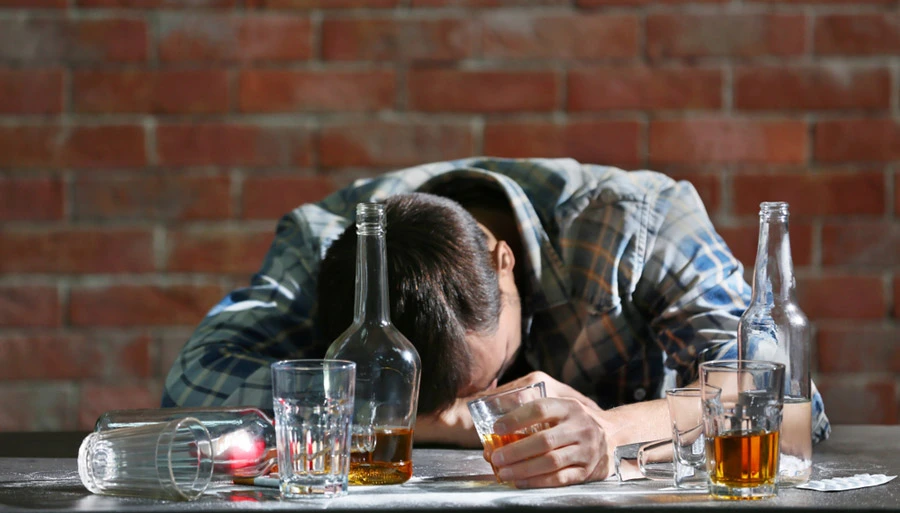Effective Programs to Treat Psychosis Caused by Alcohol
When many people think of alcohol addiction, they might associate it with hangovers, impaired judgment, and long-term health consequences. However, there’s a darker and less-talked-about side to alcohol abuse that can have a severe impact on an individual’s mental health, leading to even more negative outcomes.
If you or a loved one are already struggling with psychotic symptoms brought on by alcohol, you know how debilitating and even frightening it can be. But effective support for alcohol psychosis is found at Catalina, and you do not have to suffer alone any longer!
In this guide, we will shine a light on alcohol psychosis, a devastating but treatable condition. By understanding the symptoms and treatments available, you and your loved ones can embark on the journey to recovery. Keep reading to learn more about it and how Catalina Behavioral Health can help you or a loved one get the necessary treatment.
24 Hour Alcohol Detox and Rehab Helpline
What is Alcohol Induced Psychosis?
Alcohol-induced psychosis, also known as alcohol-induced psychotic disorder and alcohol hallucinosis, is a severe mental health condition that can develop as a result of heavy chronic alcohol abuse. When alcohol starts to affect brain function and disrupt the delicate balance of chemicals and processes within the brain, a person may experience symptoms of psychosis.
Some of these symptoms can include auditory hallucinations, visual hallucinations and delusions, severe agitation, and confusion.
Chronic Alcoholic Hallucinosis vs Acute Intoxication

It’s crucial to note that while alcohol-induced psychosis shares similarities with other psychotic disorders, such as schizophrenia, it is a distinct condition brought on specifically by alcohol abuse. However, in some cases, alcohol psychosis can be a catalyst for worsening pre-existing mental health issues.
People who have been abusing alcohol for years may find themselves at risk of developing chronic alcoholic hallucinosis, a severe consequence of alcohol abuse.
Symptoms of this condition can include:
- Auditory hallucinations (hearing sounds that aren’t there)
- Erratic mood shifts
- Delusions
- Visual and tactile hallucinations
- Aggression or violence and lashing out for no reason
- Losing touch with reality
- False beliefs
- Agitation
- Fear
- Paranoia
- Other psychotic symptoms
Alcoholic hallucinosis symptoms may occur sporadically over hours or days, and in some cases, they can begin to mimic symptoms of schizophrenia and last indefinitely. Additionally, chronic alcoholic hallucinosis may lead to severe brain damage, including Wernicke-Korsakoff syndrome and long-term psychotic disorders.
in contrast, acute alcohol intoxication, even up to the point of alcohol poisoning, can cause similar effects in terms of the symptoms outlined above. The core difference is that such features will subside as intoxication diminishes for those showing signs of acute psychosis, and more slowly, if at all, for those with chronic hallucinosis.
24/7 Alcohol Withdrawal Hotline – Call Now!
What is Alcohol Withdrawal Psychosis?
Experiencing alcohol withdrawal symptoms is a necessary step in overcoming addiction, but it can also be dangerous – and even deadly. One significant risk during alcohol withdrawal is alcohol withdrawal delirium (AWD), a temporary form of psychosis that can affect long-time heavy drinkers who quit drinking or try to reduce their alcohol use.
Alcohol-withdrawal psychosis can be a part of the more commonly known delirium tremens (DTs), which can manifest with the following symptoms:
- Tremors and shaking
- Confusion
- Sweating
- Chest Pains
- Hallucinations or delusions
- Sensations akin to bugs crawling on the skin
- High blood pressure
- Seizures
It is vital to seek medical supervision and support during alcohol withdrawal to safely navigate the potentially life-threatening complications of alcohol withdrawal psychosis and delirium tremens.
Treating Alcohol Withdrawal Symptoms and Alcohol Related Psychosis

Alcoholic psychosis is a severe and life-altering consequence of alcohol abuse. The impact on both the affected individual and their loved ones can be devastating, making it more critical than ever to seek professional help and support for those struggling with alcohol addiction.
If you or someone you care about is experiencing alcohol-related psychosis from acute intoxication or chronic alcoholism, or showing signs of alcohol use disorder, don’t wait – seek help immediately.
Addiction Treatment Programs for Chronic and Acute Psychosis
There are various treatment options for alcoholic psychosis, which primarily focus on addressing the underlying cause – alcohol addiction. While there is no one-size-fits-all approach to treating alcoholic psychosis, the following steps are typically involved:
1. Medically Supervised Detoxification
The first step in treating alcoholic psychosis is to stop excessive alcohol consumption. However, withdrawing from alcohol can be dangerous, especially for individuals who have been consuming large amounts daily for an extended period. In such cases, a medically supervised detox is necessary to ensure that the individual experiences a safe withdrawal from alcohol.
During detoxification, medical professionals keep a close eye on the patient, administering medications as needed to manage withdrawal symptoms and prevent complications. Benzodiazepines, for example, may be used to reduce anxiety and the risk of seizures associated with alcohol withdrawal.
2. Antipsychotic Medications
Antipsychotic medications can help to alleviate the symptoms of alcoholic psychosis by reducing the intensity of hallucinations and delusions. These medications work by targeting the neurotransmitters in the brain, which contribute to the development of psychotic symptoms.
It is important to note that antipsychotic medications should only be used under the guidance of a healthcare professional, as their side effects and interactions with other medications must be closely monitored.
3. Long-term Aftercare and Support
Recovery from alcoholic psychosis does not end with detoxification or the resolution of acute symptoms during alcohol rehab at Catalina. Long-term treatment, aftercare, and support are crucial for maintaining sobriety and preventing relapses.
Types of Treatment For Alcohol Dependence and Mental Disorders

Alcohol dependence and mental illnesses often go hand in hand, leading to a complex and challenging path to recovery. These dual diagnoses require specialized care and comprehensive treatment plans to address both issues simultaneously.
The good news is that help is available and recovery is possible with the right approach and support system. The following are some of the various treatment options available to individuals struggling with binge drinking or chronic alcohol use and co-occurring mental disorders.
Inpatient Treatment
Inpatient treatment, also known as residential treatment, involves a stay at a specialized facility where individuals receive around-the-clock care from medical professionals and therapists. This type of treatment is ideal for clients who severely abuse alcohol – like those who have experienced alcohol psychosis – or mental illness concerns that require constant supervision.
Inpatient programs usually last 30 to 90 days and provide a structured environment, helping patients avoid triggers and focus on recovery.
PHP (Partial Hospitalization Program)
A Partial Hospitalization Program (PHP) is a step down from inpatient treatment and is ideal for individuals who have made progress but still require intensive care and support. PHP patients attend treatment at a facility during the day and return home or to a sober living environment at night.
This gives them the opportunity to practice the skills they’ve learned in treatment while still having access to professional support and care. PHP programs typically meet five days a week for six to eight hours a day.
Intensive Outpatient Treatment
IOP (Intensive Outpatient Program) treatment is tailored for those who need structured programming yet want to continue with daily obligations such as work, school, or family responsibilities. Individuals in IOP attend therapy sessions three to five times weekly for approximately three-hour long sessions that allow them to focus on recovery while keeping an element of familiarity within their lives.
Get Immediate Help For Problem Drinking!
Types of Therapy Used in Alcohol Treatment at Catalina
Therapy is an essential component of any treatment plan for alcohol use/heavy drinking and mental health issues. There are several types of therapy available that have been proven effective in helping individuals overcome these challenges. Some popular types of therapy include:
Cognitive Behavioral Therapy (CBT)
Cognitive Behavioral Therapy (CBT) is a short-term, goal-oriented therapy that focuses on changing negative thought patterns and behavioral habits. It teaches clients to identify and challenge irrational beliefs, replacing them with healthier and more adaptive ones. CBT is highly effective in treating disorders such as depression, anxiety, substance use, and other alcohol-related conditions.
Eye Movement Desensitization and Reprocessing (EMDR)
EMDR is a trauma-focused therapy specifically designed to help individuals process and heal from traumatic experiences. This therapy helps clients reprocess traumatic memories, enabling them to develop healthier ways of coping with them. EMDR has been shown to be effective in treating post-traumatic stress disorder (PTSD), which is often seen alongside substance abuse.
Dialectical Behavior Therapy (DBT)
DBT is a type of therapy that focuses on teaching clients how to cope with stress, regulate emotions, and improve their relationships. Originating as a treatment for borderline personality disorder, this therapy has evolved into an effective approach for a variety of mental health and substance use disorders.
12-Step Meetings and Other Forms of Support

Twelve-step programs, such as Alcoholics Anonymous (AA) and Narcotics Anonymous (NA), offer a supportive and structured environment for individuals looking to overcome addiction. Members are encouraged to work through a series of spiritual and practical steps designed to foster personal growth, accountability, and self-awareness.
The strength of these programs lies not only in their structured approach but also in the supportive community they create. Meetings allow members to connect with others who have faced similar struggles, providing valuable insights, support, and compassion throughout the recovery journey.
Medications Used During Alcohol Psychosis Treatment
In some cases, medication can be a valuable component in the treatment of alcohol-induced psychosis, alcohol dependence, and co-occurring mental disorders. Here are two common medications that can be used in conjunction with other treatments:
Antidepressants
Antidepressants, such as selective serotonin reuptake inhibitors (SSRIs) and serotonin-norepinephrine reuptake inhibitors (SNRIs), help to alleviate depression and anxiety symptoms that can accompany addiction, making it easier for individuals to participate in treatment and continue on their path to sobriety.
Anti-anxiety Medications
In some cases, anti-anxiety medications can be prescribed to help manage the anxiety symptoms that can accompany withdrawal or co-occurring mental health issues. It’s essential to work closely with a healthcare provider to determine the appropriate medication and dosage.
Aftercare and Relapse Prevention

Recovery from alcohol dependence and mental disorders is an ongoing process that demands long-term commitment and support. Aftercare and relapse prevention play crucial roles in sustaining sobriety and managing mental health symptoms. Various support systems and tools can be incorporated into an individual’s aftercare plan, including:
- Support Groups: Groups like Alcoholics Anonymous, Narcotics Anonymous, and SMART Recovery provide a sense of community and shared experiences, fostering ongoing recovery and support.
- Therapy: Continue working with a therapist to address any underlying issues, develop coping strategies, and maintain mental health stability.
- Medication: Some individuals may require medication for ongoing treatment of mental health disorders or to decrease alcohol cravings.
- Lifestyle Changes: Prioritizing healthy habits like exercise, balanced nutrition, and stress management can contribute to sustained recovery.
- Accountability: Engaging with a support network of friends, family, and recovery-focused peers can help maintain accountability and encourage long-term sobriety.
Get Accredited Treatment Options for Alcohol!
Get Help for Alcohol Induced Psychosis at Catalina Today
Alcoholic psychosis is a grave and often under-discussed aspect of alcohol abuse that requires increased awareness and understanding. If you or a loved one struggles with alcohol addiction, recognizing potential risks and actively seeking assistance can make a massive difference in conquering addiction and preventing the long-lasting consequences.
It’s never too late to seek help and take control of your life. If you’re unsure where to start or would like more information about alcohol abuse treatment, consider reaching out to a professional addiction counselor or therapist to guide you on the right path toward recovery.
All calls to the facility are confidential. Don’t hesitate to reach out for help with alcohol use disorder and get sober support options for yourself or your loved one today!





